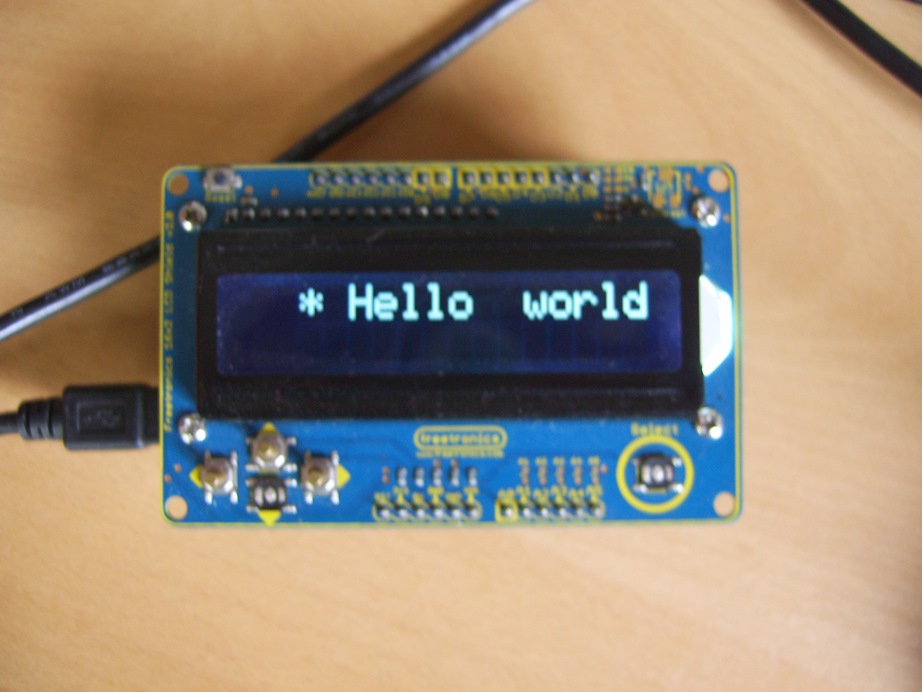A basic library for the Freetronics arduino LCD shield.
Dependents: freetronicsLCDShield_HelloWorld prototipo prototipo Juego
freetronicsLCDShield
Comments
A library for the arduino targeted freetronics LCD shield (http://www.freetronics.com/products/lcd-keypad-shield#.UmzHGBDvfRU) This is my first attempt at publishing a library so bare with. The LCD is fully functional, the buttons however are not yet fully implemented.
Member functions
Constructor
freetronicsLCDShield (PinName rs, PinName e, PinName d0, PinName d1, PinName d2, PinName d3, PinName bl, PinName a0);
Custom character generation
void writeCGRAM (char address, const char *ptr, char nbytes);
Characters that aren't included in the default character map can be written by the LCD controller 's character generator ram spaces (i.e. 0, 8, 16 .. 7 * 8). Each custom character consists of eight bytes in witch the lower 5 bits correspond to a pixel on the display. For example; the ° character witch isn't included in the default character map could be stored in the character generator RAM with:
<instanceName>.writeCGRAM(0, {0b00001100,
0b00010010,
0b00010010,
0b00001100,
0b00000000,
0b00000000,
0b00000000,
0b00000000}, 8);
Note: The binary values must be replaces by their corresponding hex or decimal values.
The ° character can now displayed by calling <instanceName>.putc(0) function.
Back-light control
void setBackLight (bool blStatus); void setBackLight (float blIntensity);
Cursor control
void home(void);
The cursor returns home (i.e. the cursor is placed at 0,0), the screen is NOT cleared. Consecutive writes to the LCD overwrite the display.
void setCursorPosition (int line, int col); void setCursor (bool cStatus = true, bool blink = false);
These are rather self-explanatory
Shift instructions
void shiftLeft (void); void shiftRight (void); void shift (bool direction);
When direction is set the display shifts left, else it shifts right
Clearing the display
void cls (void);
Button support
float readButton(void);
There is rather limited button support, you can read the status of the button pin as a float value.
Hello world
#include "mbed.h"
#include "freetronicsLCDShield.h"
// These are the custom chars 8 of them 1 per row.
const char CGRAM_DATA[64]={0x00,0x00,0x00,0x00,0x00,0x00,0x00,0x1F,
0x00,0x00,0x00,0x00,0x00,0x00,0x1F,0x1F,
0x00,0x00,0x00,0x00,0x00,0x1F,0x1F,0x1F,
0x00,0x00,0x00,0x00,0x1F,0x1F,0x1F,0x1F,
0x00,0x00,0x00,0x1F,0x1F,0x1F,0x1F,0x1F,
0x00,0x00,0x1F,0x1F,0x1F,0x1F,0x1F,0x1F,
0x00,0x1F,0x1F,0x1F,0x1F,0x1F,0x1F,0x1F,
0x1F,0x1F,0x1F,0x1F,0x1F,0x1F,0x1F,0x1F};
/* freetronicsLCDShield LCD(rs, e, d0, d1, d2, d3, bl, a0); */
freetronicsLCDShield LCD(PTA13, PTD5, PTA4, PTA5, PTC8, PTC9, PTA12, PTB0);
int main() {
// Write custom generated chars to the
LCD.writeCGRAM (0x00, &CGRAM_DATA[0], 8);
LCD.writeCGRAM (0x08, &CGRAM_DATA[8], 8);
LCD.writeCGRAM (0x10, &CGRAM_DATA[16], 8);
LCD.writeCGRAM (0x18, &CGRAM_DATA[24], 8);
LCD.writeCGRAM (0x20, &CGRAM_DATA[32], 8);
LCD.writeCGRAM (0x28, &CGRAM_DATA[40], 8);
LCD.writeCGRAM (0x30, &CGRAM_DATA[48], 8);
LCD.writeCGRAM (0x38, &CGRAM_DATA[56], 8);
LCD.cls();
// The backlight can be turned on or off //
LCD.setBackLight(true); wait(2.0);
// The setBackLight method is overloaded so you can specify it's intensity by supplying it with a float value
LCD.setBackLight((float) 0.05);
while (true) {
LCD.cls();
LCD.setCursor(false);
// You may want to set the cursor position at a specific location
LCD.setCursorPosition (0, 0);
LCD.printf("* Hello world *");
// Shift the text on the LCD left ...
for(int i = 0; i < 3; i++) {LCD.shift(true); wait(0.5);}
// Shift right ...
for(int i = 0; i < 6; i++) {LCD.shift(false); wait(0.5);}
// Shift the text back to left ...
for(int i = 0; i < 3; i++) {LCD.shift(true); wait(0.5);}
LCD.setCursorPosition (1,0);
// Let the cursor blink
LCD.setCursor(true, true);
LCD.putc('A'); wait(0.5);
LCD.putc('w'); wait(0.5);
LCD.putc('e'); wait(0.5);
LCD.putc('s'); wait(0.5);
LCD.putc('o'); wait(0.5);
LCD.putc('m'); wait(0.5);
LCD.putc('e'); wait(0.5);
LCD.cls();
LCD.setCursor(false);
// You may want to set the cursor position at a specific location
LCD.setCursorPosition (0, 0);
LCD.printf("Backlight = %0.3f", 0.000);
int n = 0;
for (float intensity = 0.125; intensity <= 1.0; intensity += 0.125) {
// Fire up the backlight
LCD.setBackLight((float) intensity);
// Display intensity
LCD.setCursorPosition(0,11);
LCD.printf("%0.3f", intensity);
// Print the custom char's 0 .. 7
LCD.setCursorPosition(1,4+n);
LCD.putc(n);
n++;
wait(0.5);
}
}
}
Picture

 Freetronics LCD Shield
Freetronics LCD Shield